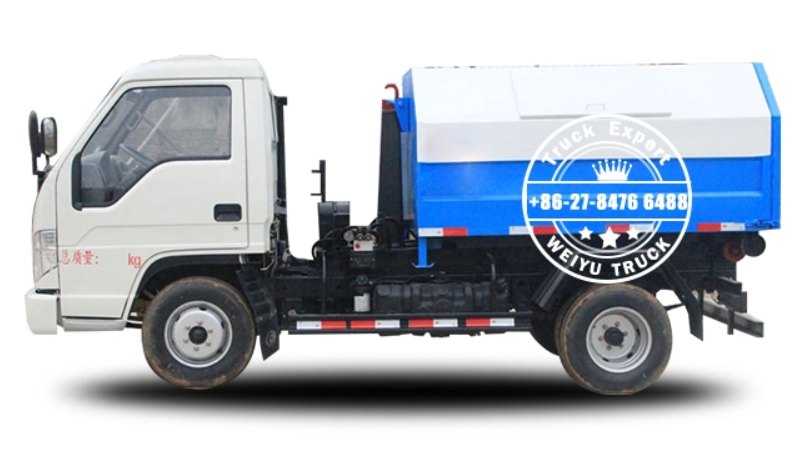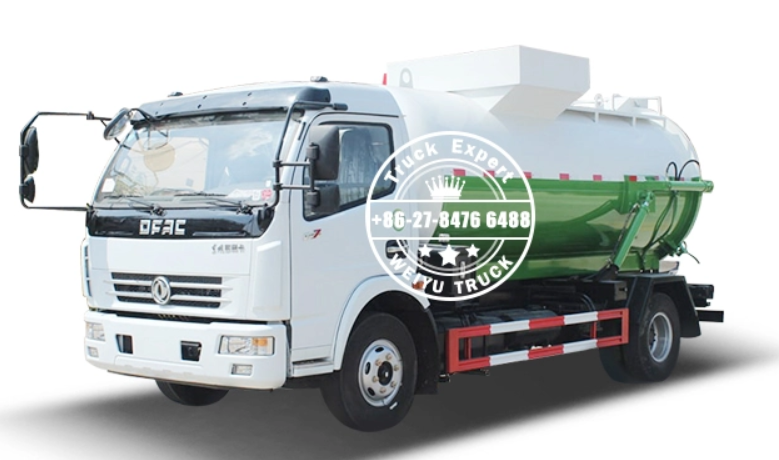Views: 0 Author: Site Editor Publish Time: 2024-12-18 Origin: Site








Garbage trucks play an essential role in urban waste management, ensuring that cities and communities remain clean and sanitary. However, due to the nature of the job, garbage trucks can become extremely dirty, carrying not only the waste but also the risks of contamination, odors, and pests. Proper maintenance and cleaning of garbage trucks are vital for extending their lifespan, ensuring they run efficiently, and meeting health and safety regulations. In this article, we will discuss how often garbage trucks should be cleaned, the best practices for cleaning them, and the importance of regular maintenance. Additionally, we will explore specific types of garbage trucks, such as the Garbage Compactor Truck, and how their cleaning needs may differ from other types.
Before diving into how often garbage trucks should be cleaned, it is essential to understand why cleaning is so crucial for these vehicles. Here are some key reasons:
Garbage trucks, especially those used for collecting organic waste or food scraps, can quickly accumulate foul odors. If left uncleaned, these smells can permeate the vehicle and the surrounding areas, creating an unpleasant experience for drivers and nearby residents. Regular cleaning helps to mitigate this issue.
Waste collection vehicles can be breeding grounds for bacteria, mold, and pests. Contaminated waste, especially organic and medical waste, can result in the growth of harmful pathogens. If garbage trucks are not cleaned regularly, these bacteria can spread, posing significant health risks to workers, residents, and the environment.
When garbage trucks are not cleaned regularly, accumulated dirt, grime, and waste can affect the vehicle's mechanical components. This could lead to clogs in the hydraulic system, reduced engine performance, or problems with the waste collection mechanisms. Regular cleaning helps ensure the smooth operation of the truck.
In many regions, municipalities or regulatory bodies have guidelines in place that require garbage trucks to maintain a certain level of cleanliness. Regular washing helps ensure compliance with these regulations and prevents fines or sanctions.

The frequency of cleaning a garbage truck depends on several factors, such as the type of garbage being collected, the environmental conditions, and how often the truck is in use. Let’s break it down for different types of trucks and scenarios.
For most garbage trucks used in residential waste collection, cleaning should occur on a regular schedule. Typically, this means cleaning the vehicle at least once a week if it is used daily. If the truck is used for more specialized tasks, like collecting hazardous or medical waste, more frequent cleaning is necessary.
Volume of Waste: Trucks that handle large volumes of waste will likely need more frequent cleanings to maintain hygiene.
Type of Waste: Trucks that collect food waste or organic material will need more regular cleaning to avoid odors and contamination.
Weather Conditions: In warmer climates, bacteria and odors build up faster, so cleaning might need to be done more often.
Garbage Compactor Trucks are designed to compress waste, allowing them to carry more material. Because of the compacting mechanism, waste is often tightly packed, and residual materials can get stuck in the truck's compaction chamber, the hopper, and the press. These trucks generally require more frequent cleaning than other types of garbage trucks.
Ideal Cleaning Schedule:
Once a Week: If the garbage compactor truck is used daily, it should be cleaned at least once a week to prevent odors, mold, and bacteria build-up.
After Every Load: In some cases, especially with organic waste, cleaning after every load may be necessary to prevent any lingering residue or pests from infesting the truck.
Hook Lift Trucks and Rear Loader Garbage Trucks are often used for transporting larger, bulkier waste materials like construction debris, commercial waste, or heavy industrial waste. Since the waste is not compacted in the same way as it is in a Garbage Compactor Truck, these trucks can typically go longer without needing a deep cleaning.
Ideal Cleaning Schedule:
Every Two Weeks: A general cleaning every two weeks is usually sufficient unless the truck handles particularly dirty or odorous waste.
More Frequent Cleaning for Specific Wastes: If the truck is used to carry construction debris or hazardous waste, more frequent cleanings may be necessary to maintain hygiene and avoid contaminating other materials.
Food waste can be one of the messiest and most odorous types of garbage. Food Waste Garbage Trucks are used to collect organic waste from restaurants, homes, and food processing facilities. Because of the high moisture content, these trucks can accumulate bacteria and produce strong odors if not cleaned properly.
Ideal Cleaning Schedule:
After Every Load: Ideally, food waste garbage trucks should be cleaned after every collection to avoid the build-up of mold, bacteria, and pests.
Weekly Deep Cleaning: In addition to the daily or post-load cleaning, a thorough deep cleaning should be done on a weekly basis to remove all residues and ensure the truck remains hygienic.

The cleaning process for garbage trucks can vary depending on the type of waste being handled, but there are general steps that should be followed to maintain cleanliness and ensure the vehicle's performance.
Before starting the cleaning process, conduct an inspection of the truck’s exterior and interior. This will help identify any areas that require special attention, such as clogged hoses, damaged seals, or excessive grime. For trucks like garbage compactor trucks, check the compaction system to ensure it’s functioning properly.
Power washing is one of the most effective ways to clean the exterior of a garbage truck. A high-pressure washer is used to blast away dirt, grime, and any leftover waste materials on the body, undercarriage, and the compaction area. This is especially important for trucks handling organic waste, as food particles can easily get stuck to the surfaces.
For trucks that store waste inside, it is essential to clean the hopper and storage area thoroughly. Depending on the truck type, this might involve:
Manual Scrubbing: For smaller areas or if there are stubborn residues.
Automated Wash Systems: Some garbage trucks are equipped with automated cleaning systems that rinse and scrub the storage areas without needing manual labor.
Disinfection is crucial, especially for trucks that handle food or medical waste. A strong disinfectant should be applied to kill any bacteria or pathogens that may be lingering in the truck. After applying the disinfectant, let it sit for a few minutes before rinsing it off.
After cleaning, ensure that all hydraulic systems (such as those used for lifting bins or compacting waste) are in good working order. Inspect seals and hoses for any signs of wear or leaks, and make sure the compaction system is functioning correctly. Any signs of damage should be addressed immediately to prevent operational failure.
Once the truck is thoroughly cleaned and disinfected, dry it off to prevent rusting, especially in areas exposed to water. Regular maintenance of the truck is essential to prevent corrosion and ensure that the cleaning process doesn’t affect its long-term functionality.
For municipalities or companies operating garbage trucks, partnering with reliable manufacturers like Hubei Weiyu Special Vehicle Co., Ltd. can help ensure you have access to high-quality vehicles that are easier to maintain and clean. The company’s range of garbage trucks and other specialized vehicles like sewage suction trucks, sweepers, and water sprinkler trucks are designed with durability and ease of maintenance in mind.
Garbage Trucks: From garbage compactor trucks to hook lift trucks, Hubei Weiyu provides a wide selection of vehicles designed for various waste collection needs.
High-Performance Features: Their garbage trucks are built to withstand the rigors of daily use and are equipped with features that make cleaning and maintenance easier, such as durable materials and easy-to-access compaction systems.
Global Reach: With products sold in regions like Africa, Southeast Asia, South America, and the Middle East, Hubei Weiyu has established a reputation for providing high-performance vehicles at a competitive price point.
For most garbage trucks, cleaning should be done at least once a week. However, trucks used for food waste or hazardous materials may require cleaning after every load or more frequent deep cleaning.
A garbage compactor truck should be power-washed, and its compaction chamber should be thoroughly scrubbed. After cleaning, disinfect the truck and inspect the compaction mechanism to ensure it’s working efficiently.
Yes, regular cleaning and maintenance can significantly extend the lifespan of a garbage truck. Cleaning helps prevent rust, contamination, and damage to the mechanical components of the